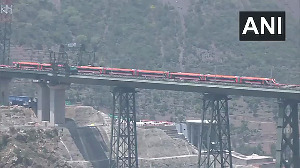Defending World Bank's assistance in setting up of coal-fired power plants in India, its President Robert Zoellick said if developing nations are deprived of energy it will be counter-productive and a setback for the larger issues of climate change.
"It will be important for the environment community to also work with the developing world as we are trying to do. Because if the developing world believes that climate change is going to take away their basic development resources or in a way limit their energy use, I think it will be a setback to the larger issue of climate change," Zoellick said while interacting with a group of reporters ahead of the Spring Meetings of the World Bank and the International Monetary Fund this weekend.
During the Spring Meetings, the issue of Bank's involvement in Botswana and the Tata's Mundhra's plant in Gujarat is likely to come up during the interactive session.
It is claimed that the Tata's plant will account for nearly 28 million tonnes of carbon dioxide emission when fully operational.
"In the Indian case there is the sense that if you look at India's energy needs, they are very, very significant and where we can we try to look for other sources. But in this case we felt we could also help from a climate technology point of view," the top Bank official said.
Terming climate change as today's crisis, he said "the core principle is the interest of the developing countries.
Our principal focus of climate change is trying to recognise that climate change is not tomorrow's uncertainty for developing countries. It is today's crisis."
Our overall drive is on the recognition that
climate change is a development issue that means we need to work closely with the developing countries, Zoellick added stressing it is the Bank's view that more resources by way of financing are necessary and there is recognition in the developing world that the Bank is trying to give additional sources of funding.
"My assessment is that we are going to need more, not less money if we are going to help developing countries with these issues," he maintained.
"What we have tried to emphasise (on coal-fired plants) is that it starts out with the fact that if developing countries feel that climate change is a reason why they won't get energy to grow, you are going to lose developing countries from supporting adaptation and mitigation measures for climate change. We want to help and try deal with climate change
issues but we also want to try and help developing countries grow," he said.
Climate change will be one of the many issues that will feature this year's Spring Meetings of the Bank and the IMF.
The expectation being that finance ministers and Central Bank governors will be quite pre-occupied with the global financial and economic conditions with much of the developing world being concerned with the ramifications with the downtrend in the economic growth of major powers with the implications on several issues including in the rising energy and food prices.
Union Finance Minister P Chidambram will lead the Indian delegation to the Bank's meeting. The minister is expected to make important policy statements to the International Monetary and Finance Committee on Saturday and to the Development Committee on Sunday.






